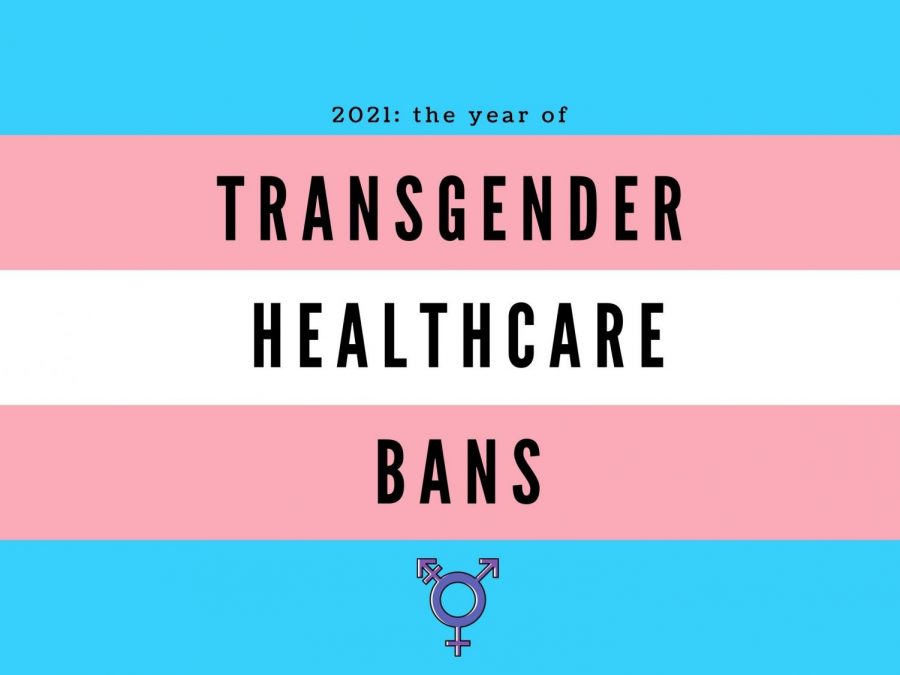American legislature has a dark history of targeting trans people. Whether it be “bathroom bills” which try to keep trans people from using the bathroom with the gender identity they belong to, or a constant fight to keep trans people out of the sport they want to play, laws have been aiming to limit the rights of trans people for a long time. But now, a new wave of laws is taking place. This set goes even farther than before, criminalizing medical care for trans children that would affirm their gender identity, enacting different punishments and fines and even defining such actions as child abuse.
This recent push for anti-trans legislation has been, unsurprisingly, mainly concentrated in heavily Republican states. At least 30 states have proposed some form of medically trans-restrictive legislation, with 18 specifically related to youth. The United States as a whole is currently suffocating under the weight of almost 200 anti-trans bills in state legislatures. Medical legislation like this, especially targeted at youth, could restrict around 41,500 trans children from gender-affirming medical care. Some states have tried to sneak their restrictions into legislation that aims to prevent child abuse or endangerment, but all of these bills are merely baseless threats to the autonomy that trans people deserve.
Arkansas in particular has been the center of media attention recently. Legislators introduced a bill copiously banning necessary healthcare that many trans people rely on, such as puberty blockers, hormone therapy and transition-related therapy. The bill then went even farther, prohibiting doctors from even referring patients to places where they could receive gender-affirming care.
Missouri isn’t exempt from blame either. Two medically-restrictive bills are currently cycling through the legislative process. One bill was introduced last year which revoke the medical licenses of doctors who provided care and immediately report the parents of care-seeking children to Child Protective Services on charges of child abuse.
The toll that medically-restrictive legislation takes on trans people is unequivocally disastrous, inhumane and completely regressive. Not to mention, the idea of a gender binary is a colonialist one, which many Indigenous populations did not follow. According to Michael Paramo for Medium, “European colonizers marked Indigenous gender and sexual variance as inferior for the purposes of asserting their white cisgender heterosexual manhood as the pinnacle of human existence.”
So to continue to force these notions of what people should look like is a perpetuation of colonialism that brought an unnatural system upon many communities in the first place. The effects of this are overwhelmingly adverse.
Organizations of doctors and medical professionals have been demanding that state congresses deny the bills. The American Psychological Association, the American Psychiatric Association, the American Academy of Pediatrics and the Endocrine Society all oppose legislation and legal action that seeks to disrupt gender-affirming healthcare, citing the many risks that arise when trans people do not have access to the healthcare they need.
The American Academy of Child and Adolescent Psychiatry wrote in response to the Arkansas bill, “Research consistently demonstrates that gender diverse youth who are supported to live and/or explore the gender role that is consistent with their gender identity have better mental health outcomes than those who are not.”
Suicidal ideation has also been shown to increase with a lack of gender-affirming healthcare, along with other negative mental health situations. Some trans people have turned to controlling their food intake as a way to assuage gender dysphoria, a slippery slope that attempts to aid one mental health issue while allowing another to deteriorate. Without gender-affirming healthcare, states are putting their own citizens at a greater risk for mental health struggles.
It is important to note, however, that even if a lack of access to gender-affirming healthcare had absolutely zero detrimental effects on trans people, they still deserve the opportunity to acquire medical care. Trans people do not need any reason other than their own free will to make these decisions and seek gender-affirming care. People deserve to express themselves how they want, without interference.
That being said, these effects are very real. Trans people do face greater mental health challenges when gender-affirming healthcare is banned, and states are trying to pass them anyway. In the words of obstetrician-gynecologist Dr. Deb Thorp, “A transgender person may experience an emotional condition known as gender dysphoria. This can happen if the discomfort with one’s physical self is very distressing. It is most commonly experienced prior to a person transitioning. And it can cause dysfunction in their day-to-day activities like work or social events.”
So far, the American Civil Liberties Union has promised to fight the ban in court, saying in a statement in response to Arkansas’ decision to override the governor’s veto, “We will continue to fight for you. The ACLU is preparing litigation as we speak. ACLU supporters from around the country spoke out against this bill. We will always have your back and will be relentless in our defense of your rights.”
Trans people exist. They are loved, they are powerful and they are stronger than many of us could ever imagine. They cannot be silenced with discriminatory legislation enacted by vote-hungry politicians. These types of bans are inhumane, and they won’t do anything to “stop” people from being trans. Denying healthcare to people because of who they are is immoral and disgusting, and we can’t stand for it.
Now is the time to step up for trans people. They have been fighting a long, hard battle for rights that the rest of us don’t think twice about. While legal battles like the ones taken on by the ACLU can help trans youth now, we need more. Fighting for trans rights means fighting for the divestment and abolition of the systems that hold us back. In the words of Angela Davis, “The trans community taught us that it is possible to effectively challenge that which is considered the very foundation of our sense of normalcy. So if it is possible to challenge the gender binary, then we can certainly, effectively, resist prisons and jails and police.”
All of the institutions that hold us back, that fear those who are different, must be reimagined. As Davis observes, the fight for trans rights overlaps, intertwines, and informs our fight for justice elsewhere. We need to win this fight, we need to protect our ability to face the antiquated gender binary head on, because it can take us to forms of resistance in other aspects. But most of all, trans people deserve the chance to live their lives free of state interference on their bodies, and we must all work to make this a reality.




![Sitting courtside before a junior varsity girls’ tennis match, senior Tanisi Saha rushes to finish her homework. Saha has found herself doing academic work during her athletic activities since her freshman year. “Being in sports has taught me how to stay organized and on top of my schoolwork. [With] a busy practice and game schedule, I’ve learned to manage my homework and study time better,” Saha said.](https://pwestpathfinder.com/wp-content/uploads/2025/11/DSC_0022-1200x800.jpg)
![Sophomore Maryem Hidic signs up for an academic lab through Infinite Campus, a grading and scheduling software. Some students enjoyed selecting their responsive schedule in a method that was used school-wide last year. “I think it's more inconvenient now, because I can't change [my classes] the day of, if I have a big test coming and I forget about it, I can't change [my class],” sophomore Alisha Singh said.](https://pwestpathfinder.com/wp-content/uploads/2025/10/DSC_0012-1200x801.jpg)
![Senior Dhiya Prasanna examines a bottle of Tylenol. Prasanna has observed data in science labs and in real life. “[I] advise the public not to just look or search for information that supports your argument, but search for information that doesn't support it,” Prasanna said.](https://pwestpathfinder.com/wp-content/uploads/2025/10/DSC_0073-2-1200x800.jpg)
![Junior Fiona Dye lifts weights in Strength and Conditioning. Now that the Trump administration has instituted policies such as AI deregulation, tariffs and university funding freezes, women may have to work twice as hard to get half as far. "[Trump] wants America to be more divided; he wants to inspire hatred in people,” feminist club member and junior Clara Lazarini said.](https://pwestpathfinder.com/wp-content/uploads/2025/05/Flag.png)
![As the Trump administration cracks down on immigration, it scapegoats many immigrants for the United States’ plights, precipitating a possible genocide. Sophomore Annabella Whiteley moved from the United Kingdom when she was eight. “It’s pretty scary because I’m on a visa. When my visa expires next year, I’m not sure what’s going to happen, especially with [immigration] policies up in the air, so it is a concern for my family,” Whiteley said.](https://pwestpathfinder.com/wp-content/uploads/2025/05/DSC_0077-7copy.jpg)
![Shifting global trade, President Donald Trump’s tariffs are raising concerns about economic stability for the U.S. and other countries alike. “[The tariffs are] going to pose a distinct challenge to the U.S. economy and a challenge to the global economy on the whole because it's going to greatly upset who trades with who and where resources and products are going to come from,” social studies teacher Melvin Trotier said.](https://pwestpathfinder.com/wp-content/uploads/2025/05/MDB_3456-1200x800.jpg)



![Some of the most deadly instances of gun violence have occurred in schools, communities and other ‘safe spaces’ for students. These uncontrolled settings give way to the need for gun regulation, including background and mental health checks. “Gun control comes about with more laws, but there are a lot of guns out there that people could obtain illegally. What is a solution that would get the illegal guns off the street? We have yet to find [one],” social studies teacher Nancy Sachtlaben said.](https://pwestpathfinder.com/wp-content/uploads/2025/01/DSC_5122-1200x800.jpg)

![Sophomore Shree Sikkal Kumar serves the ball across the court in a match against Lindbergh. Sikkal Kumar has been a varsity member of the varsity girls’ tennis team for two years, helping her earn the number two rank in Class 2 District 2.“When matches are close, it’s easy to get nervous, but I [ground] myself by[staying] confident and ready to play,” Sikkal Kumar said.](https://pwestpathfinder.com/wp-content/uploads/2025/11/DSC2801-1200x798.jpg)
![Dressed up as the varsity girls’ tennis coach Katelyn Arenos, senior Kate Johnson and junior Mireya David hand out candy at West High’s annual trunk or treat event. This year, the trunk or treat was moved inside as a result of adverse weather. “As a senior, I care less about Halloween now. Teachers will bring their kids and families [to West’s Trunk or Treat], but there were fewer [this year] because they just thought it was canceled [due to the] rain. [With] Halloween, I think you care less the older you get,” Johnson said.](https://pwestpathfinder.com/wp-content/uploads/2025/10/DSC00892-1-1200x800.jpg)
![Focused on providing exceptional service, sophomore Darsh Mahapatra carefully cleans the door of a customer’s car. Mahapatra has always believed his customers deserve nothing less than the best. “[If] they’re trusting us with their car and our service, then I am convinced that they deserve our 100 percent effort and beyond,” Mahapatra said.](https://pwestpathfinder.com/wp-content/uploads/2025/10/DSC_0018-1200x800.jpg)
![Sophomore Aleix Pi de Cabanyes Navarro (left) finishes up a soccer game while junior Ava Muench (right) warms up for cross country practice. The two came to Parkway West High School as exchange students for the 2025-2026 school year. “The goal for the [exchange] program is to provide opportunities for both Parkway students and our international exchange students to learn about other cultures, build connections and become confident, capable, curious and caring — Parkway’s Four C’s — in the process,” Exchange Program Lead Lauren Farrelly said.](https://pwestpathfinder.com/wp-content/uploads/2025/10/Feature-Photo-1200x800.png)
![Leaning on the podium, superintendent Melissa Schneider speaks to Parkway journalism students during a press conference. Schneider joined Parkway in July after working in the Thompson School District in Colorado. “My plan [to bond with students] is to get things on my calendar as much as possible. For example, being in [classes] is very special to me. I am trying to be opportunistic [meeting] kids [and] being in [the school] buildings. I have all the sports schedules and the fine arts schedules on my calendar, so that when I'm available, I can get to them,” Schneider said.](https://pwestpathfinder.com/wp-content/uploads/2025/09/IMG_5425-1200x943.jpeg)
![Gazing across the stage, sophomore Alexis Monteleone performs in the school theater. The Monteleone family’s band “Monte and the Machine” has been releasing music since 2012, but Alexis started her own solo career in 2024 with the release of her first single, Crying Skies. “My whole family is very musical, [and I especially] love writing [songs with them],” Monteleone said.](https://pwestpathfinder.com/wp-content/uploads/2025/09/DSC7463-1200x798.jpg)

![Leaping through the air, senior Tyler Watts celebrates his first goal of the season, which put the Longhorns up 1-0 against the Lafayette Lancers. Watts decided to play soccer for West for his last year of high school and secured a spot on the varsity roster. “[Playing soccer for West] is something I had always dreamed of, but hadn’t really had a good opportunity to do until now. It’s [really] fun being out [on the field], and I’m glad I decided to join the team. It’s just all about having fun with the boys and enjoying what time we have left together,” Watts said.](https://pwestpathfinder.com/wp-content/uploads/2025/09/DSC_1951-1200x855.jpg)


Alex • Apr 28, 2021 at 11:47 am
I would like to see an article that is unbiased on this topic. Perhaps giving more view points from the other side of the political aisle. Obviously, this is a controversial topic, so one would have to tread lightly when speaking from a conservative view point – especially in today’s word. However, I think seeing both sides of an argument is important if the audience wants to form an educated opinion.
Debra Klevens • Apr 28, 2021 at 12:42 pm
Thank you for your feedback, Alex. This article was published in the opinion section. We would love to have a student with a differing opinion share their perspective.
Susan Santhuff • Apr 28, 2021 at 8:52 am
Excellent article, well written!